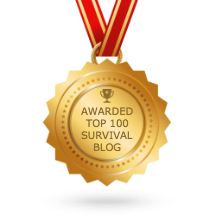
The idea of preparedness goes many ways– from people who will hide under their beds when disaster strikes all the way to people who are able to be almost entirely self sufficient for many years.
If you are reading this blog then you're probably somewhere in between.
A good way to help you focus on your preparedness needs and to get really prepared is to know what types of disasters could happen to you and then to decide which ones could truly happen to you. A good way to get those ideas is to grab a notebook and make a list! Once you have that list in front of you, preparing is easy because you are focused on a specific event rather than just the vague concept of preparedness. Let’s take a look at the range of disasters for you to consider.
Personal disasters – These include things like losing your job, getting told that your hours are being cut, getting injured on work and going on disability , having a change in your family
Natural disasters – These can include any of the following events: hurricanes, tornadoes, floods, forest fires, earthquakes, tsunamis, crippling ice/ snow storm, etc.
Extreme weather events – These events include both mega storms like Hurricane Sandy as well as long term weather events – like extreme drought that brings on really severe water restrictions and affects food crops/ prices as farmland wilts.
Nuclear events – From the reactor disaster in Japan recently to the possibility of a rogue nation launching a nuclear weapon, possible EMP attacks, dirty bombs, etc., the idea of a nuclear event is again on peoples minds.
Terrorist attacks – These can happen anywhere as their purpose is to instill terror. If terrorism grows, it wouldn’t be surprising to see the targets change from high value ones like NYC to anyplace they can cause a terror event where a large number of people congregate – shopping, sporting events, schools, etc. – just to spread the idea of fear and lack of safety no matter where you live.
Biological events – Whether natural or man made, the is always a chance of an epidemic or pandemic occurring. A particular virulent flu variant or a manufactured biological weapon are both very real possibilities.
Economic collapse – Will it cause hyperinflation, wiping out your savings overnight? Will it cause the stock market to crash, wiping out your 401K? A bank run? Supply shortages as no one wants to trade with us because of the instability of our currency? Runaway fuel prices? You get the idea.
Collapse of civilization – This is the mega event that could be caused by a new world war or massive natural event like a super volcanic eruption or large asteroid impact event. As you can see, there are many types of events that could potentially affect your future. By taking a look at the list, you can decide which are likely and make definite preparedness plans for them.
Other events that we see as more remote but possible include an economic collapse on a larger scale, a long term drought (which happens fairly frequently here – but never super severe), and a potential nuclear event as there are nuclear reactors within 100 miles and if they ever get damaged and the wind blows the right way… it would not be optimal.
So for us, we are fully prepared income interruptions by having a secure (and fully rotated) food and water supply to last the duration. We also have an emergency cash reserve to make sure we can make up any shortfalls for a long period of time.
Make your own list of events that you believe could impact your lives. Then prioritize them in terms of duration. Once you have them prioritized, figure out what you would need to survive the shortest duration event and then gather that set of supplies. Once you feel you are prepared for this event, you can start working on longer term preparedness.
Preparedness is a process and a journey that is best started by taking baby steps. Develop that small preparedness plan and then execute it. Then build on that for the next level of preparedness, etc. and soon you will be able to make it to the far side of just about any disaster than can hit your family.





1 comments:
I prepare for two things, essentially: physical disasters (i.e. earthquake) and financial disaster (losing a job, or change in job circumstances). I have a few "emergency bags" used when needed. I have a bag at my desk for work emergencies which includes what could be needed while at work (sewing kits, brush, deodorant, female products). My work bag includes supplies in the event I need to walk home from work or stay at work for any reason (walking shoes, socks, change of clothes, personal protection items weapons and weather related clothing).
I won't go into all the details I have at home as a way to prepare for life unexpectedness. An example, though is from last year, Our sewer line backed up and we had no functioning toilet because of the way the raw sewage would back up into the basement if we flushed the toilet. Out of necessity, we purchased an emergency camping toilet. The purpose of an emergency kit is for any unforeseen event...It's a work in progress, for sure.
Post a Comment